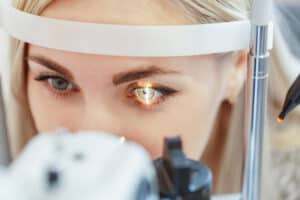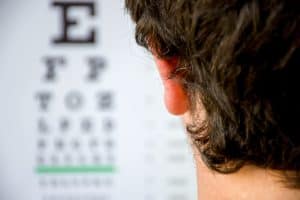About Eye Exams
 Having your eyes regularly examined by a skilled eye doctor is important for ensuring the lifelong health of your eyes and vision. During an eye exam at Laser Eye Center of Miami, our doctors will check your vision and general eye health, including:
Having your eyes regularly examined by a skilled eye doctor is important for ensuring the lifelong health of your eyes and vision. During an eye exam at Laser Eye Center of Miami, our doctors will check your vision and general eye health, including:
- Refractive errors, such as nearsightedness
- Vision changes, which may indicate cataracts or problems with the retina
- Issues with the supportive muscles in the eye, including strabismus
- Eye tumors and cancer, such as intraocular melanoma
Exams are also important for detecting eye health issues early, which can make certain conditions easier to treat.
Eye Tests
During a complete eye exam, our doctors will first discuss your health and family history with you. Additionally, several eye tests may be conducted; some will help determine if you need eyeglasses or contact lenses, while others can assess your eye function or check for diseases. Standard eye tests include:
Visual acuity: This test requires the patient to read letters on an eye chart from a distance, covering one eye at a time. Patients may also read the letter through a special device called a phoropter, which contains several lenses that may help patients see more clearly. This test allows doctors to determine whether you need glasses for better vision.
Visual field: Visual field tests are performed to check your peripheral vision. This involves patients following an object with their eyes only as it moves within their visual field, usually side to side, up and down, and up close and far away. This helps our doctors determine your full visual range.
Color vision test: Your eye exam may also include a color vision test, which tests for color blindness, also known as color deficiency. During this test, patients are shown several images of colored dots and numbers that are a different color. Individuals with color blindness may have difficulty seeing the numbers.
Corneal topography: This test essentially uses technology to create a map of your cornea. Thousands of images of your eye are taken as you look at an object. This test helps identify astigmatism in patients and allows our doctors to prescribe the appropriate contact lenses. It can also be used in preparation for a corneal transplant or other procedures.
Tonometry: Elevated eye pressure can indicate the presence of glaucoma, a serious, vision-threatening eye condition. Eye pressure can be checked during tonometry, during which a small puff of air is blown onto the cornea.
Ophthalmoscopy: This test requires eyedrops to dilate the pupil in a process that takes about 15 minutes. After, a light is used to examine the important structures of the eye, including the retina, lens, optic nerve, and cornea, as well as the neighboring blood vessels.
How Often Should I Have an Eye Exam?
 Most people should visit the eye doctor for a complete exam every one or two years. However, individuals who are at an increased risk of certain eye diseases may need more frequent examinations. This can include those who:
Most people should visit the eye doctor for a complete exam every one or two years. However, individuals who are at an increased risk of certain eye diseases may need more frequent examinations. This can include those who:
- Are over 60
- Suffer from obesity
- Have had eye surgery
- Have a family history of eye conditions, such as glaucoma
- Use eyeglasses and contact lenses
FAQs
What Is the Difference Between a Vision Screening and a Comprehensive Eye Exam?
A vision screening is a basic test often performed at schools, workplaces, or during routine physicals. It checks for obvious vision problems but does not provide a detailed assessment of eye health. A comprehensive eye exam, on the other hand, is conducted by an eye doctor and includes a thorough evaluation of your vision, eye structures, and potential underlying health conditions.
At What Age Should Children Start Getting Eye Exams?
Children should have their first eye exam at six months of age, followed by another at age three, and again before starting school. Regular exams throughout childhood ensure that vision problems do not interfere with learning and development. If a child shows signs of vision difficulties, such as squinting or trouble reading, an exam should be scheduled sooner.
How Can You Prepare for Your Eye Exam?
Before your appointment, make a list of any symptoms you’ve been experiencing, such as blurry vision, eye strain, or headaches. If you wear glasses or contact lenses, note any changes in your vision. Be ready to provide a detailed medical history, including any medications you take, as they can impact your eye health.
What Should You Bring to Your Eye Exam Appointment?
To ensure a smooth exam process, bring your current glasses or contact lenses, a list of medications, and any relevant medical records. If your insurance covers eye exams, have your insurance information ready. You may also want to bring sunglasses in case your eyes are dilated during the exam.
Will Your Eyes Be Dilated During the Exam, and How Long Does It Last?
Dilation is a common part of a comprehensive eye exam, allowing the doctor to examine the back of your eyes more thoroughly. The effects of dilation typically last 4 to 6 hours, during which you may experience light sensitivity and blurred vision.
Can You Drive After Having Your Eyes Dilated?
It depends on your comfort level. Some people feel fine driving after dilation, while others find the temporary blurriness and light sensitivity make it difficult. If you’re unsure, arrange for someone to drive you home after your appointment.
What Are the Signs That You Need an Eye Exam Sooner Than Scheduled?
If you experience sudden vision changes, eye pain, flashes of light, or frequent headaches, you should schedule an eye exam immediately. Other signs include difficulty seeing at night, double vision, or increased eye strain when reading or using screens.
Can an Eye Exam Detect Other Health Issues, Such as Diabetes or High Blood Pressure?
Yes, comprehensive eye exams can reveal early signs of systemic health conditions, including diabetes, high blood pressure, and even certain neurological disorders. The blood vessels in your eyes can reflect changes in your overall health, making routine exams essential.
How Do You Schedule an Eye Exam at Laser Eye Center of Miami?
Booking your appointment at the Laser Eye Center of Miami is simple. Call the office or visit the website to schedule a convenient time. Whether you need a routine exam or have specific vision concerns, the experienced team is ready to provide expert care tailored to your needs.
Schedule Your Next Eye Exam
Eye exams can help you see more clearly and identify eye issues that can jeopardize your vision, including diseases that do not have symptoms until after damage has been done. Schedule your next comprehensive eye examination today by calling our office or using the online form to request an appointment.






